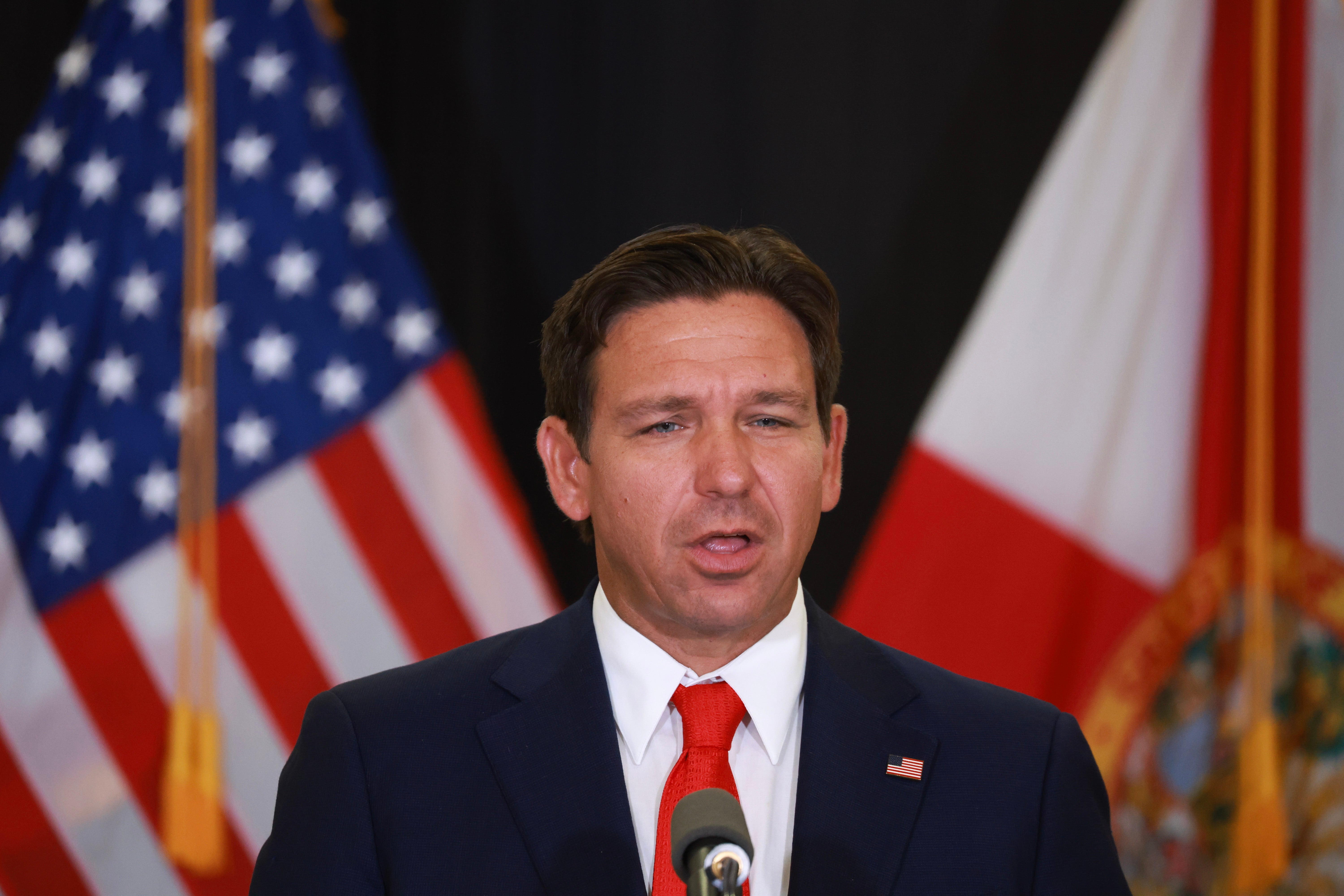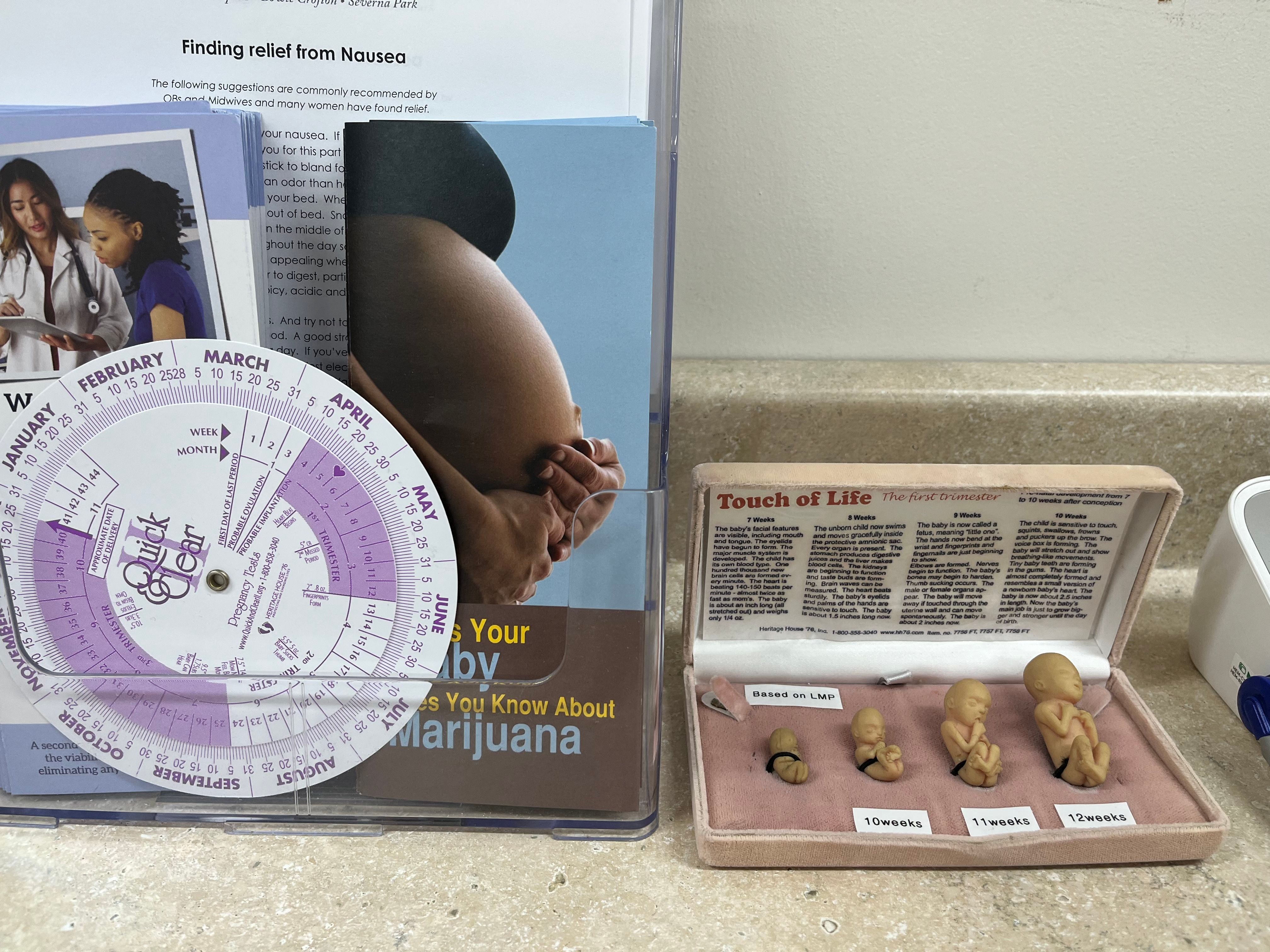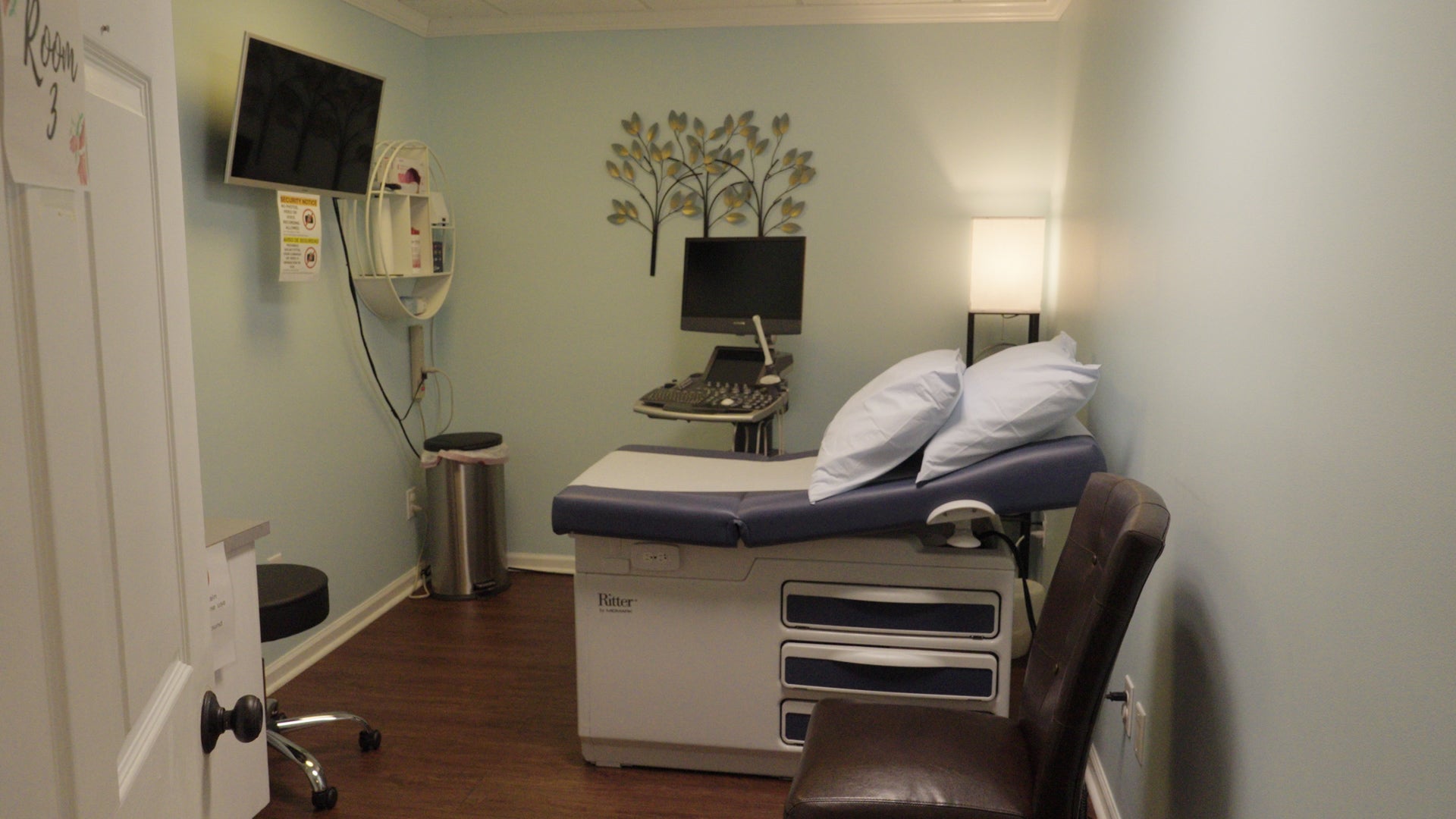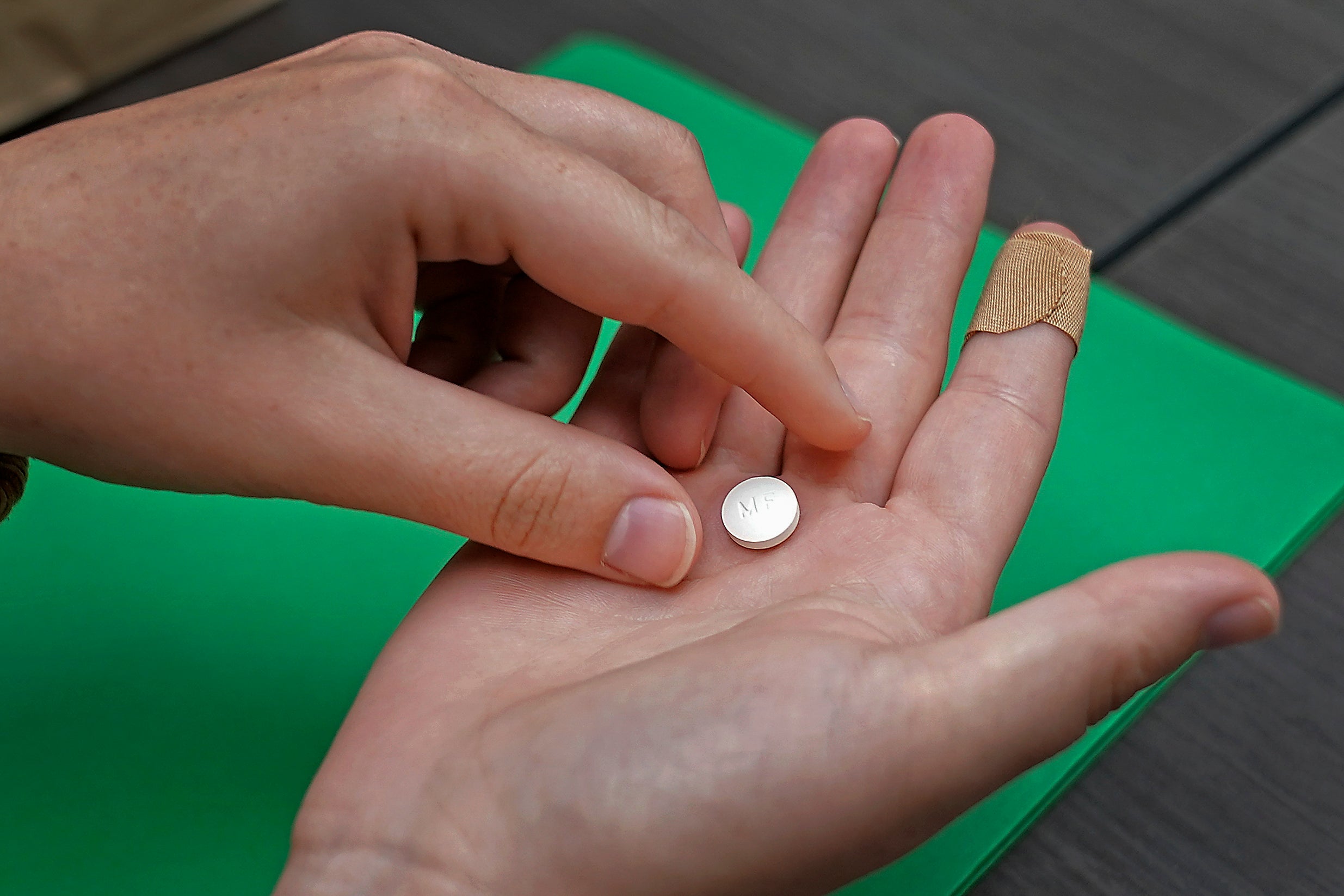Republican lawmakers have steered over half a billion in taxpayer dollars to anti-abortion clinics. Where does it go next?
Exclusive: States are spending millions of dollars in public money to fund fake clinics and religious counseling. Alicja Hagopian and Alex Woodward report, with exclusive research from Reproductive Health and Freedom Watch
This story is part of an investigative series and new documentary, The A-Word, by The Independent examining the state of abortion access and reproductive care in the US after the fall of Roe v Wade.
Over just four years, anti-abortion lawmakers in Republican-dominated states have funneled more than half a billion dollars in taxpayer funds to a multi-billion-dollar industry that steers women away from terminating their pregnancies with “fake” healthcare clinics.
These clinics — also known as crisis pregnancy centers (CPCs), many of which are supported by religious organizations — are designed to prevent patients from seeking an abortion.
They may appear to look like medical facilities, with clinicians in scrubs and white coats and advertisements for ultrasounds and pregnancy tests, but they often don’t employ doctors, and they have been accused of manipulating patients with false or medically unproven claims about reproductive healthcare.
Public money has been flowing into CPCs within the last several years, but “direct taxpayer funding is increasing even faster,” according to exclusive research from Reproductive Health and Freedom Watch (RHFW) in partnership with The Independent.
According to their own tax documents, with all government grants combined — which could range from Covid-19 relief to federal and local funds — CPCs have received nearly $1 billion ($976 million) in public funding since 2020. Some of those federal funds were intended to support lower-income families and children.
But nearly half of that billion-dollar sum comes directly from state legislatures, which have approved bills to fund anti-abortion clinics.
Within the two years before the Supreme Court’s 2022 decision in Dobbs v Jackson Women’s Health Organization, which sent shockwaves through the US by holding that there was no constitutional right to abortion care, state legislatures appropriated roughly $184 million to these CPCs.
In the 2023 and 2024 budgets, that figure from state legislatures rose to at least $329 million in direct funding.
At least 21 state legislatures have appropriated taxpayer dollars to fund part of CPCs’ activities, as shown in the map above. Two more, Pennsylvania and Minnesota, stopped funding in 2023.
Seven states (that we know of) have created new public funding programs for CPCs within the last four years. Lawmakers are turning to funding mechanisms like tax credits, sales tax exemptions and government contracts.

The estimated number of crisis pregnancy centers ranges from at least 2,600 to more than 2,750, according to industry think tanks. Regardless, the number of fake clinics outnumber the nation’s abortion clinics by as many as three times over.
Thirty million women are now living under abortion bans and severe restrictions that have magnified the already patchwork state of reproductive healthcare across the country. More than one-third of the US is considered a maternity care desert, where there is not a single birthing facility or obstetric clinician, according to a 2024 report from March of Dimes.
States that use public dollars to support CPCs also have some of the highest maternal and infant mortality rates in the US.
In Mississippi, which has the highest maternal mortality rate in the country, with 39.1 deaths per 100,000 births, lawmakers who supported clinic tax credits have also tried to block Medicaid expansion to support postpartum care.
In Arkansas, where maternal mortality rates are 38.3 deaths per 100,000 births, lawmakers introduced legislation to double direct taxpayer funding to clinics while Governor Sarah Huckabee Sanders has rejected that Medicaid coverage.
There is often little to no government oversight to justify the spending. In fact, measures to require greater oversight in states like North Carolina have been blocked, leaving much of the industry’s activity shrouded in mystery.
The industry has managed to rack up at least $1.7 billion in revenue in 2022 alone, according to RHFW’s review of tax documents.
This revenue is reported by under two-thirds of the industry’s projected total; overall, the industry is projected to exceed $2 billion in revenue annually.
“It is unconscionable for politicians to funnel public dollars into fake clinics without holding them accountable or regulating them,” Alice Wang, staff attorney for legal and advocacy group Center for Reproductive Rights, told The Independent.
“Anti-abortion extremists market fake clinics as resources for low-income pregnant women, but these findings emphasize that their exorbitant budgets are not going towards providing care or services, much less towards addressing the maternal and infant health crises in the states that fund them,” she said. “Fake clinics have gotten away with defrauding the public for too long.”
Targeting abortion seekers
One woman who shared her story with The Independent said that when she unknowingly entered a crisis pregnancy center, it looked like any other doctor’s office in Florida, with a staff of women in white coats.
She filled out an application, was asked about her grade point average, whether she goes to church, and if she plans to get married. She asked to take a pregnancy test they provided at home, but the women in white coats insisted she take it there.
“They told me that this was God’s plan, that having a baby would give me purpose in life, and that I certainly shouldn’t leave my partner because he was going to step up as a man, and that this was the best thing that could have happened,” she said.
The test was positive. She started crying. A woman handed her a rubber fetus, telling her that “it’s my destiny now, and that’s what’s growing inside me.”
She had planned to visit a health clinic to learn more about abortion care. Instead, the CPC workers told her that abortion “doesn’t solve your problem ... It makes you the mother of a dead child.”
This patient was not the first to be misled by a CPC, some of which appear to pose as abortion clinics and attract those same clients.

One way in which these clinics are actively seeking new clients is by spending in excess of $31 million on advertising in 2022 alone, our analysis shows.
Reports in 2023 found that Google had earned at least $10 million in the previous two years from advertisements for the clinics, with ads appearing for searches such as “abortion clinic near me” or “abortion pill.”
Roughly 73 percent of that advertising was targeted in states that did not have any restrictions on abortion.
That tactical advertising appears to reflect the industry at large, which places greater emphasis on actively stopping women from getting abortions than providing maternal and reproductive care.
This is also reflected in the chosen locations of these clinics, many of which are strategically placed near or next to legitimate abortion clinics.
But, in order to receive state funding, CPCs allege that they provide necessary maternal care and resources for those in need.
Acting outside of that mandate — and targeting patients who would otherwise seek care from a rival clinic that provides those services, such as Planned Parenthood — could be seen as a misuse of public funds.
Members of Congress are also asking government accountants to investigate federal funds diverted to CPCs, raising concerns about organizations that “claim to provide reproductive health care for pregnant people but whose ultimate motive, often achieved through deception, misinformation, and intimidation, is to prevent people from accessing abortion care.”
For private donors, which provide the bulk of funding to these clinics (roughly 87 percent), it is no less important for CPCs to be explicit about their activities.
While some people likely donate to CPCs specifically for a religious or anti-abortion purpose, others may be misled by their promises to provide overall wellness and maternal care.
Where does the money go?
Analysis by The Independent and RHFW suggests that in many cases, CPCs are a poor investment for states in terms of the actual goods and services they provide. By the industry’s own admission, revenues are exceeding the estimated value of services that CPCs provide by more than 380 percent.
CPCs provided $367 million in goods and services in 2022 — including pregnancy tests, ultrasounds, and STI testing — according to anti-abortion think tank the Charlotte Lozier Institute. That makes up just one-fifth of revenues, under conservative projections, and 24 percent of expenditures. It is unclear exactly how the costs of goods and services are measured.
By any metric, this is a poor ratio of money to output, according to Debra Rosen, executive director of RHFW.
At worst, the time and money that goes unchecked could allow the CPC industry to shroud further anti-abortion and religious campaigning under the guise of charity work, Rosen told The Independent.
In some states like Pennsylvania, the ratio was even worse. While CPCs received more than $76.3 million in 2022 alone, they provided just $8.9 million in value, according to state-level analysis from the Charlotte Lozier Institute.
That amounts to just 12 percent of revenues translated into goods and services, which may have factored into the state’s decision to cease taxpayer funding to CPCs as of 2023.
While it can be difficult to “value” the quality of these services, the number of people seeking help from crisis pregnancy centers is not increasing.
According to the Charlotte Lozier Institute, the number of new clients served has increased by less than 1 percent since 2019. Other industry leaders, like Heartbeat International, reported a 47 percent decline in client demand in 2023.
Yet CPC revenues have increased by nearly 75 percent since 2019, from at least $1 billion in 2019 to more than $1.75 billion in 2022.
That’s an increase of at least $750 million annually, with no visible increase in services provided or people reached.
Earlier this year, anti-abortion non-profit Live Action was criticized by fellow activists for focusing too much of its $13.5 million revenue on costly anti-abortion ads and high salaries. Instead, they argued that funds could be better spent supporting crisis pregnancy centers.
This suggests that the anti-abortion movement is unaware of how exactly the CPC industry is spending its own funds.
Rebranding and bunk science
Some CPCs have been “rebranding,” or transitioning away from religious messaging towards a decidedly secular and medical image — despite the fact that a vast majority of CPCs do not employ medical professionals.
Thirty-seven percent of CPCs have changed or operated under multiple names between 2019 and 2022, according to RHFW.
Clinic names often rely on explicitly religious and anti-abortion language — from Choices of the Heart, Birthright, and A Baby’s Breath to His Love Family Resources and Catholic Family Services.
Yet others are more generic: Pregnancy Resources, Pregnancy Resource Connection, A Women’s Care Center, Options Medical Clinic, Cornerstone Reproductive Health.
Clinic names have been changed to become increasingly “medicalized,” according to RHFW.

Wisconsin’s Bella Medical Services was formerly known as Labor of Love. In Tennessee, a center named Abortion Alternative Christian Services now operates as Agape Women’s Services.
Other names have pregnancy tests or ultrasounds in their names, such as Gateway Express Testing or Pregnancy Test and Help Center.
But the names conceal the vast majority of CPC work: religious counseling.
While support for such clinics is typically positioned as a response to infant and maternal health needs, only 5 percent of such clinics provide prenatal care, and a majority of clinics “distract and divert pregnant women from the legitimate medical system to promote their own [ideological] ends,” according to a 2021 report.
Though some CPCs see themselves as providing legitimate alternatives to reproductive health clinics, others promote bunk science.
Many CPCs promote “abortion pill reversal,” claims that the American College of Obstetricians and Gynecologists says are not based in science.
The organization has called the practice “unproven and unethical”; and New York Attorney General Letitia James is suing anti-abortion group Heartbeat International for “false and misleading statements to advertise an unproven treatment.”

Many CPCs also only offer “limited” ultrasounds, which identify a pregnancy and the gestational period but do not offer any insight into birth defects or other issues that could affect a patient’s health.
The website for CPC organization Obria Medical Clinics — which operates in six states — has the glossy sheen of a hospital system and boasts of its “board-certified physicians, nurse practitioners, [and] registered nurses.” But the group does not test for birth defects via ultrasound, nor will it refer women to abortion providers.
In 2019, Obria received a $5.1 million federal grant to support family planning over three years, and nearly half a million dollars in other government grants in 2022.
The Independent has requested comment from Obria.
Former Obria CEO Dawn Hughes told Elle that crisis pregnancy centers “don’t want a pregnant woman who is looking for help.”
“Their whole goal is to get you to say: ‘I’m going to keep the baby,’” she told the magazine in August. “They are zealots.”
‘Obfuscate the truth and reality’
In Louisiana, where abortion is outlawed at all stages of pregnancy, with only limited exceptions, lawmakers in 2024 agreed to boost annual public funding for anti-abortion clinics from $1 million to up to $5 million for the next fiscal year.
All of that money would go through a single non-profit organization to be determined by the state, led by anti-abortion Republican Governor Jeff Landry and a Republican-dominated state legislature.
The state’s “alternatives to abortion” program would be renamed to the “Louisiana Pregnancy and Baby Initiative,” with additional funding for parenting classes and supplies.
In Florida, where abortion is now outlawed at six weeks of pregnancy, before most women know they are pregnant, the state approved an explosion of funding for the state’s public-funded “alternatives to abortion” program, which now is on track to receive $25 million in taxpayer dollars a year — collecting in one year nearly as much as the program received over the last decade.
An investigation from Reveal/Miami Herald discovered that one of the clinics run by the program — Mary’s Pregnancy Resource Center — had failed to file required tax forms over three years, and the Internal Revenue Service had temporarily revoked its tax-exempt status. Yet it continued to receive public funds.
The clinic has since pulled out of the Florida Pregnancy Care Network, with nearly $170,000 in federal tax liens against it. An eviction notice also was posted on its building, with a sign reading “we’re moving.” The center did not respond to multiple requests for comment.
Abortion rights advocates and lawmakers have argued that the lack of transparency surrounding these clinics demands urgent intervention.
Florida state Senator Lauren Book introduced two bills in 2023 that would regulate crisis pregnancy centers in the state and codify protections for clinics that provide abortion care.
Book proposed annual audits for fake clinics, which would also be required to provide medically accurate information about pregnancy and information about local sexual assault treatment options.
“They are not real doctors,” she told The Independent. “They obfuscate the truth and reality for women to kind of string them along. … You have a very quick window to make decisions when it comes to a pregnancy.
Thank you to Reproductive Health and Freedom Watch for exclusive research and assistance on this piece.
Join our commenting forum
Join thought-provoking conversations, follow other Independent readers and see their replies
Comments
Bookmark popover
Removed from bookmarks